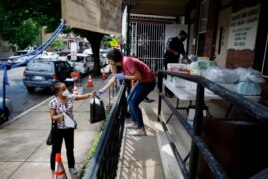21 June 2020
During several weeks of protests over police killings and abuse of black Americans, many police forces have clashed with activists. But in Camden, New Jersey, a poor city of mostly brown and black people, police and activists marched together.
"Our actions can accelerate situations. What we should be trying to do is de-escalate them," said Scott Thomson, who retired from the Camden County Police Department in 2019. "The last thing we want is for the temperature to rise, and for situations to go from bad to worse because of our failed tactics."
Thomson led an effort in 2013 to form a new police department to guard Camden after state and local officials disbanded the city's force.
At the time, the city had experienced one of the highest crime rates in America. It also saw years of law enforcement abuses and corruption.
Thomson believed that the public and officers themselves, saw the police as warriors. He sought a police department of officers who identify as guardians first.
More than 300 officers lost their jobs when the city dismissed the force. About half of them were rehired to serve in the new police department. The reform also brought on younger officers, often from outside of Camden. Other changes included increased community policing and expansion of high-tech city-wide observation systems.
Many consider the Camden police reform effort a major success. Still, it might not be the changes protesters seek.
"That is a very different vision of what a new police force looks like than we're hearing from protesters, who want less policing," said Stephen Danley, a professor of public policy at Rutgers University-Camden.
Ashly Estevez-Perez has spent most of her 21 years in Camden. She remembers when children were rarely permitted to leave their homes because gunfire was so common.
"The new police force came in, and you saw cars everywhere. ... Everyone was kind of taken aback," she said of what some would call "over-policing."
"Growing up in the city, I don't see what other alternative works," said Estevez-Perez.
Sean Brown is an activist, businessman and father of two in Camden. He says the city's surveillance system solves the wrong problem.
"If we had economic justice in our community, where anybody who needed a job could get a job, we would be in a different space," said the 37-year-old.
Dekel Levy is an officer in the Camden County Police Department. He praised the seven-year-old force.
"I think we're received a lot better than we used to be," he said. The 41-year-old spoke as he helped give out baby care products to parents at Guadalupe Family Services in North Camden.

In this June 11, 2020, photo Lourdes Sherby, center, with Guadalupe Family Services, hands diapers to Louisa Peralta in Camden, N.J. "I think we're received a lot better than we used to be," said Sgt. Dekel Levy, 41, as he helped hand out diapers.
The neighborhood, long one of the city's poorest and most dangerous, shows signs of progress. The state prison that stood on the nearby waterfront has been replaced with a park. Aging schools have been fixed up.
Crime rates have fallen in Camden.
Police department data shows the yearly murder rate dropped from 67 in 2012 to 25 last year. Robberies also went down in the same period from 755 to 304. And attacks with guns decreased from 381 to 250. The city of about 73,000 people spends $68 million per year on policing, far more than some comparable cities.
Professor Danley agrees that Camden is safer than it once was. But he said it is not clear that the new force is directly responsible for that.
During Camden's Black Lives Matter protest, Police Chief Joe Wysocki helped carry the large sign at the front of the march.
"I just felt I had to do it. George Floyd's death was very difficult to watch, and it was horrifying what he went through," Wysocki said.
Helen Cole, a Roman Catholic nun, runs the Guadalupe Family Services group. She has lived in Camden almost 30 years and has seen tensions rise and riots break out.
Today, she cheers officers who work with troubled teens and department data that shows a sharp drop in reports of police abuses. In 2014 there were sixty-five cases. Last year there were three.
"It's not like officers are the enemy anymore," Cole said.
Still, Sean Brown says too few in the city of Camden find employment on the police force.
He says "the same political will" that went to tearing down and rebuilding the police department is needed to deal with other issues, like job development and housing.
Brown added, "The momentum has to continue for us to get where we need to go."
I'm Caty Weaver.
Maryclaire Dale of the Associated Press reported this story. Caty Weaver adapted it for VOA Learning English. Hai Do was the editor.
________________________________________________________________
Words in This Story
accelerate - v. to cause to move faster or speed up
de-escalate - v. to decrease the size, scope, or intensity of something
tactic - n. an action or method that is planned and used to achieve a particular goal
alternative - n. something that can be chosen instead of something else: a choice or option
surveillance - n. the act of carefully watching someone or something especially in order to prevent or detect a crime
momentum - n. the strength or force that allows something to continue or to grow stronger or faster as time passes
We want to hear from you. Write to us in the Comments section, and visit 51VOA.COM.